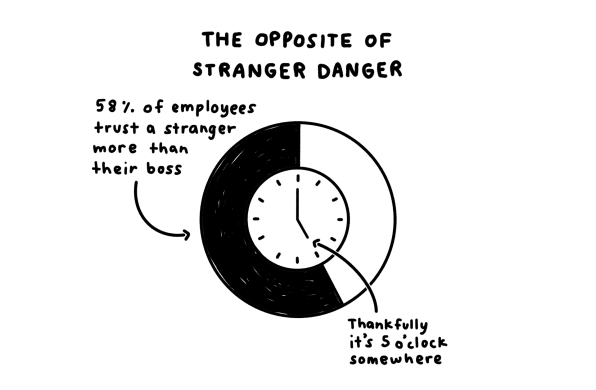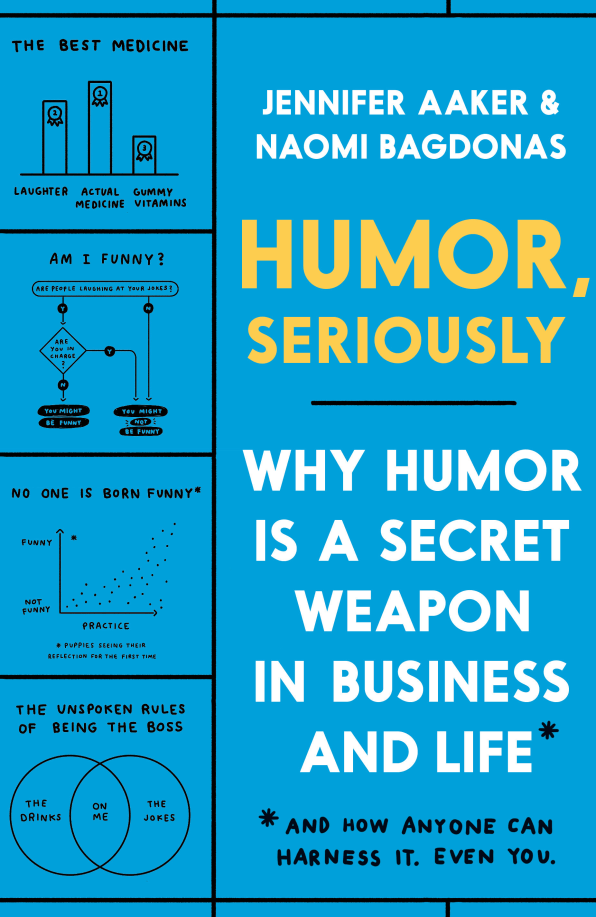Humor is such an important leadership trait we teach it at Stanford’s business school
But the days of the mythic and infallible leader are behind us.
In the wake of a decades-long series of shocking events such as the Enron scandal in 2001, the Fukushima nuclear disaster in 2011, and the storming of the US Capitol in 2021 at the urging of the sitting president, our collective trust in leaders has been severely dented, if not totaled.
This degradation of trust in leadership has firmly implanted itself in the minds of employees: A 2019 Harvard Business Review survey found that 58 percent of employees trust a complete stranger more than their own boss.

As you might expect, these numbers are only getting worse.
What’s more, 45% of employees cited their lack of trust in leadership as the single biggest issue impacting their performance at work.
And you (leaders) seem to agree: 55% of CEOs believe that this crisis in confidence is a threat to your organization’s growth. And you aren’t wrong to worry. Lack of trust impacts your employees’ motivation and productivity. It impacts the likelihood that they’ll jump ship for a new company. And it impacts how much time you (and everyone else) spend frantically putting out fires that could have been avoided, had your people felt comfortable discussing sensitive issues with you. (Instead of with, you know, a stranger they met on the bus.)
Today’s business leaders find themselves tied with elected officials as the least trustworthy individuals in the eyes of 18-to-29-year-olds: According to a 2018 Pew Research Center survey, only 34% of these young adults trust corporate and political leaders. This is less than the percentage of Americans who own dogs, meaning that in the trustworthiness power-rankings, powerful humans are losing to domesticated wolves.
This is bad, leaders.
If this makes you want to down a bottle of wine and binge watch Schitt’s Creek at your next leadership offsite, rest assured: there is good news, and we have a plan. Because while trust in leadership is plunging, those organizations that somehow manage to maintain a high trust environment are thriving.
There is a wealth of research that links high-trust organizations to innovation and performance. The 2016 HOW Report, a comprehensive study of organizational effectiveness, concluded that employees who work in high-trust environments are 32 times more likely to take risks that might benefit the company. They’re also 11 times more likely to see more innovation relative to competition, and 6 times more likely to outperform others in their industry.
So how can today’s leaders inspire trust in their employees? A 2019 survey asked employees what characteristics inspired trust in a leader; the top responses were things like “knowing the obstacles the leader overcame to be successful” and “speaks like regular people.”Today’s employees yearn for leaders who are less mysteriously brilliant and more authentically relatable. Aspirational, yes—but not without flaws.
And what better way to be authentic, relatable, and gently fallible than through humor?
Seriously. Humor has enormous benefits for mental wellbeing, physical health, and even your bottom line.
[Register here to join authors Jennifer Aaker, Naomi Bagdonas and comedian Sarah Cooper for a special Fast Company virtual session, Humor is Serious Business, on February 4 at 2 p.m. Eastern Time.]
One study by researcher Wayne Decker found that managers perceived to have a sense of humor are rated by subordinates as 23% more respected and 25% more pleasant to work with. In contrast, a 2018 Gallup study found that nearly 50% of Americans have left a job to “get away” from a manager. Employee turnover has increased 88% over the last decade, costing companies billions. The impact of humor on employee retention is a timely salve to a silent crisis affecting leaders and organizations worldwide.
A culture of levity allows teams to play at the highest level — a belief repeated by leaders across industries and disciplines, from Spanx founder Sara Blakely to Stephen Curry of the NBA’s Golden State Warriors, to former U.S. Secretary of State Madeleine Albright, who used humor in negotiations with her counterparts in the Russian government after a particularly tense first meeting. These leaders tell a consistent story: teams that laugh together—whether in all-hands meetings before big product launches, in the locker room before the NBA finals, or in meetings of international diplomacy—perform better.

And there’s research to back this up. In one study of over 50 teams, researchers videotaped hourlong team meetings and then analyzed supervisors’ ratings of team performance. The teams that had humor demonstrated better communication and problem-solving, and performed better as a team, both during the meeting itself and over time. Humor allows people to relax, to access higher order thinking, and to feel safe sharing bold and creative ideas.
Meanwhile, we have found ourselves in the midst of a mental health crisis, with rates of depression skyrocketing to unparalleled levels as a global pandemic and social isolation pile onto already-stressful work conditions and seasonal cycles. Nearly 100,000 U.S. businesses have closed permanently since February 2020. Those who remain employed are flailing. According to a recent Harvard Business Review survey by Ron Carucci, 41% of workers feel burned out due to factors like working remotely, working longer hours, juggling family demands, threatened job security and fear of unsafe working environments. None of this is funny.
And yet most firms are massively underinvested in humor as an asset. (“Investing in my organization’s sense of humor? In this economy?”)
Reorienting towards humor is a fundamentally profitable enterprise that today’s leaders can’t afford to miss. One study found that adding a lighthearted line at the end of a sales pitch—like “my final offer is X, and I’ll throw in my pet frog”—increases customers’ willingness to pay by 18%. Another set of studies found that employees who rate their leaders as having a sense of humor—any sense of humor—are 15% more satisfied with their jobs and rate their leaders at 27% more motivating. A set of studies run by Brad Bitterly, Allison Wood Brooks, and Maurice Schweitzer demonstrate that when people use humor at work, they’re attributed 37% higher status, and seen as more competent and more confident.
Fortunately, the bar for humor in business is as low as its upside is high. A simple willingness to laugh is enough to have impact. Teams that laugh together before trying to solve a creativity challenge are more than twice as likely to succeed versus those who don’t laugh together first.
We can chalk this up to the (brain) cocktail these teams are serving up. When people laugh, a neuro-chemical response is activated: their brains flood with dopamine (which increases happiness), endorphins (which increases resilience), and oxytocin (the same “trust hormone” released during sex and childbirth—plus a way to do it that’s more HR-friendly). These hormones make us feel calmer, more confident, and more resourceful—which lowers stress and unlocks more creative thinking.
The reality is that the more technology mediated our communication becomes, the harder it is to bring our humanity and sense of humor to work. We subconsciously adapt to our medium, and when we’re constantly communicating through technology, it’s easy to sound like a robot.
But we’re also seeing so many creative ways that leaders are weaving humor into this weird new world. Connor Diemand-Yauman is the co-CEO of Merit America. His first all-hands Zoom call with his organization was scheduled amid a challenging time for the world, and a particularly divisive time in the US. Diemand-Yauman wanted to nod to the hardship of the moment while signaling care and reassurance. To acknowledge this truth, he pretended to leave his screen sharing on, and as every employee held their breath watching, Googled “things inspirational CEOs say in hard times.” Everyone lost it.
And so while you may not make history like Ernest Shackleton, Harriet Tubman, or Marco Polo, you certainly can deploy a bit of humor and humanity to inspire them. After all, as President Dwight Eisenhower once said: “A sense of humor is part of the art of leadership, of getting along with people, of getting things done.”
If Dwight David Eisenhower, the second-least naturally funny president after Franklin Pierce, thought humor was necessary to win wars, build highways, and warn against the military-industrial complex, then you might want to learn to use it too.
Reprinted with permission from Humor Seriously: Why Humor Is a Secret Weapon in Business and Life (And How Anyone Can Harness It. Even You) by Jennifer Aaker and Naomi Bagdonas; Penguin Books.
(50)



